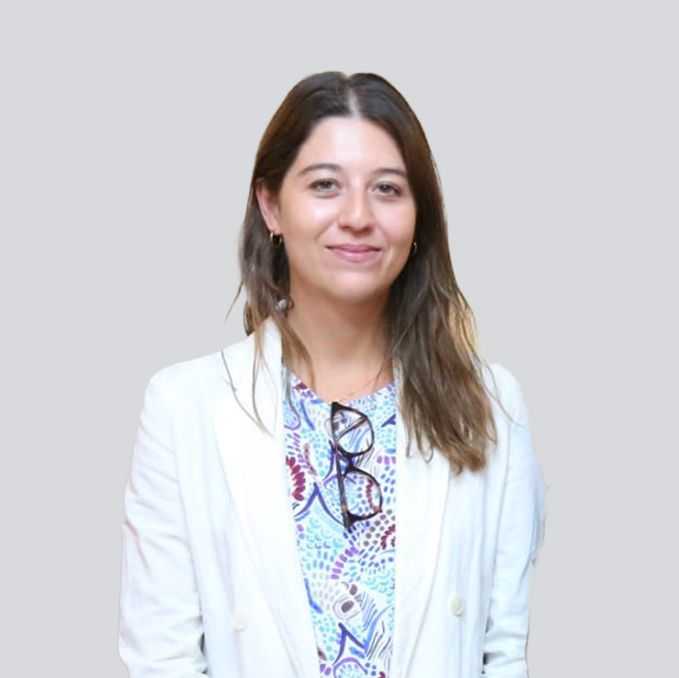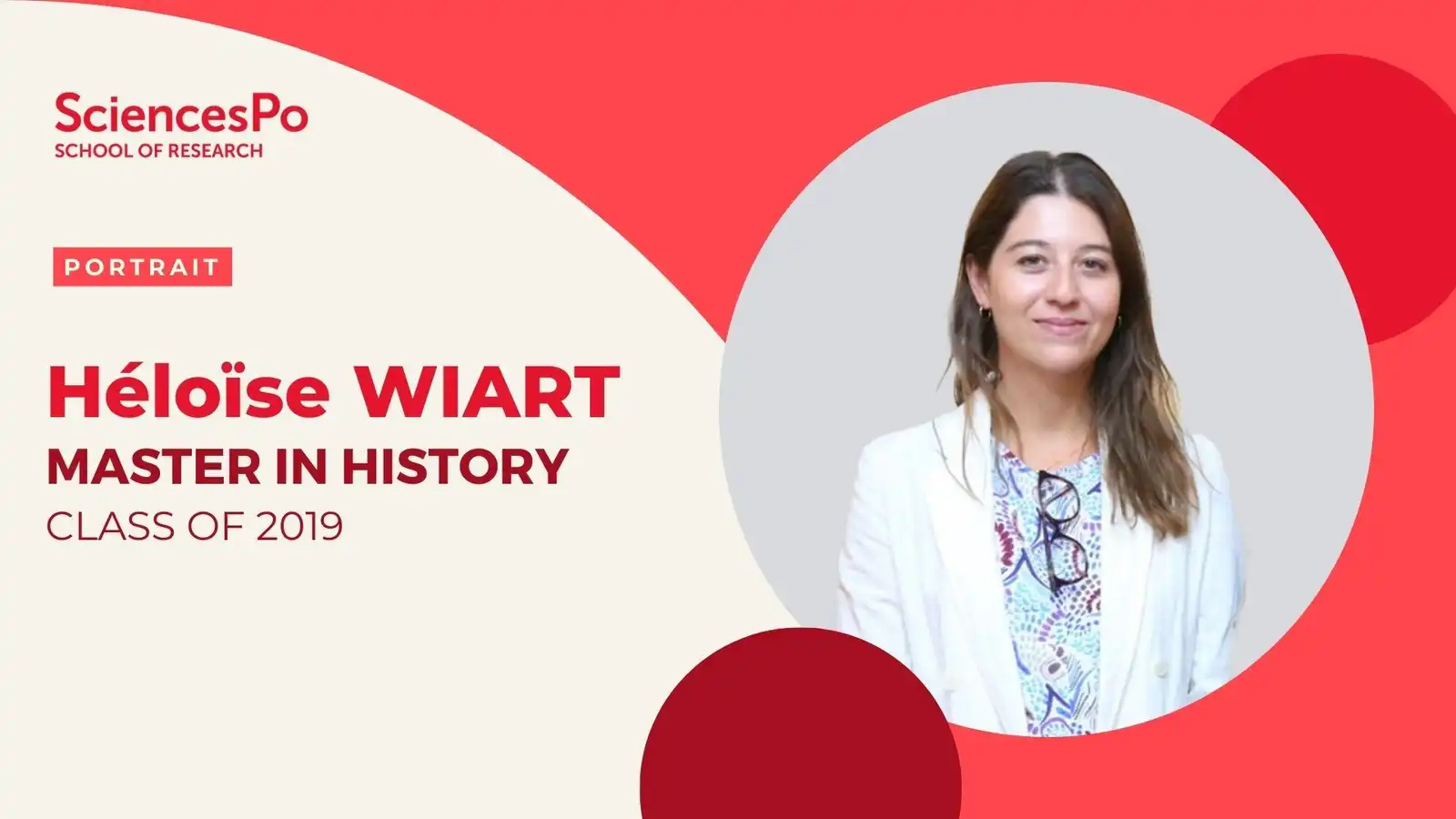Home>Héloïse WIART, Master in History (Class of 2019)
16.12.2024
Héloïse WIART, Master in History (Class of 2019)
CAN YOU TELL US ABOUT YOUR ACADEMIC BACKGROUND? HOW DID YOUR INTEREST IN HISTORY BEGIN?
After three years in a literary preparatory class, I entered Sciences Po at Masters level with the aim of doing a PhD in History. However, my in-depth research into the 1974 Cyprus crisis gradually turned my interest towards the Middle East and international security issues. This reorientation led me to pursue a second Master's degree at Georgetown University in Washington DC, where I specialised in international conflicts and crises. For me, history is not simply an accumulation of fixed facts, but an essential tool, a grid for better understanding the complex dynamics of the contemporary world. My interest is also rooted in a fascination for human stories and the pleasure of research, discovery and investigation. With the time I have spent advising policy-makers and working in different contexts, notably in West and Central Africa, and particularly the Sahel, and the Middle East, this interest has also been nurtured by a heightened sense of responsibility towards collective memory. In a sense, a commitment to work for the preservation and transmission of the past, to avoid the excesses of selective memory and the partisan exploitation of history.
WHAT HAVE YOUR YEARS AT THE SCHOOL OF RESEARCH MEANT TO YOU? WHAT MEMORIES DO YOU HAVE OF YOUR SCHOOL, YOUR CLASS AND YOUR TEACHERS?
Above all, I remember several years of great intellectual stimulation, in an international context marked by frequent conferences, interdisciplinary meetings and enriching exchanges with researchers, political decision-makers and experts from diverse backgrounds. These experiences not only nourished my intellectual curiosity but also structured my thinking. I have fond memories of the school and my classmates, some of whom have remained close friends. As for the School of Research, I think things are moving in the right direction. I think it's essential to continue to open the doors to research, to encourage bridges between research and more diversified career paths. Supporting students who want to explore cross-disciplinary paths is, in my view, a fundamental lever for developing the full potential of this discipline.
WHICH TEACHER OR COURSE OF STUDY HAS HAD THE GREATEST IMPACT ON YOU?
I was particularly struck by my History of International Relations course with Pierre Grosser. He encouraged us to question the simplifications and myths often conveyed in traditional historical accounts, and to question the dominant approaches to analysing major crises and international power struggles, in order to avoid a simplistic or Eurocentric view of events.
WHAT IS YOUR CURRENT POSITION?
After several years in Dakar (Senegal), where I conducted research on illicit trafficking in the Sahel for the United Nations Office on Drugs and Crime (UNODC), I am currently working in Erbil, in Iraqi Kurdistan, on security, political, social and economic issues, in collaboration with United Nations agencies, the European Union, various diplomatic representations and non-governmental organisations. As a freelance researcher, I advise on public policy and support the implementation of humanitarian and international development projects, providing in-depth analyses of local and regional dynamics to ensure the relevance and effectiveness of interventions.
Currently, as part of my work with UNESCO, I am involved in an emblematic cultural heritage reconstruction project in Mosul, launched after the Iraq Reconstruction Conference in Kuwait in 2018. This project aims to rehabilitate important historical and religious sites, such as the Al-Nouri Mosque and its Al-Hadba minaret, as well as the Al-Tahera and Al-Saa'a churches, all of which were severely damaged by the Islamic State seven years ago. My role is to carry out an in-depth analysis of the reconstruction project, assessing the implementation process with the contractors, the restoration techniques used and the effectiveness of the training provided to the local workforce. Beyond this highly technical aspect, I am particularly interested in the mechanisms for consultation with political decision-makers at local and national level, as well as with the Mosul community. An essential dimension of my analysis concerns the impact of this restoration on the social cohesion, sense of belonging and identity of the inhabitants of Mosul, who have been profoundly affected by years of conflict.
At the same time, I am a regular contributor to French-language and international journals, analysing the political, social and economic dynamics in Iraq. Here are a few links to my recent articles:
WHAT WERE THE MAIN STAGES IN THE DEVELOPMENT OF YOUR CAREER PLAN?
After a stint in the United States, where I worked with research centres and think tanks on international policy issues, I decided to focus my career plan on the specific needs of the field. I began by working in the Sahel, tackling issues such as illicit trafficking and terrorism. My career then took me to Iraq, a region in transition between humanitarian aid and development. In particular, I advised the Iraqi government on compensation laws for the Yazidis who were victims of Daech. My subsequent work focused on analysing relations between tribal communities and the security forces in southern Iraq, looking at the factors contributing to insecurity, including migration linked to climate change. Along the way, my priorities have been influenced by the emergence of new crises and ongoing adaptation to the needs of populations in fragile areas, while taking into account the priorities of the stakeholders involved, such as governments, international and non-governmental organisations.
HOW HAS YOUR TRAINING CONTRIBUTED TO YOUR CURRENT POSITION?
My training at Sciences Po was a determining factor in my politicisation. It enabled me to develop an acute awareness of global political and social issues, and to analyse the power dynamics that influence public decisions. Through a multidisciplinary approach, I learnt to question and deconstruct public policies, by understanding their implications for people. This has not only prepared me to tackle complex issues, but has also encouraged me to become actively involved in processes of social transformation, recognising the key role of political action in bringing about change.

« It not only prepared me to understand complex issues, but also encouraged me to become actively involved in processes of social transformation, recognising the key role of political action in bringing about change. »
Héloïse WIART
Researcher I Policy & Advocacy I Focus on Iraq & MENA
WOULD YOU HAVE ANY ADVICE FOR A STUDENT WHO WANTS TO MOVE INTO THE SECTOR IN WHICH YOU WORK TODAY?
It is essential to understand that the career path is a dynamic process, influenced by changing contexts and opportunities. Although academic training is a fundamental basis, it is not the determining factor. In other words, the mere fact that you have taken a particular Masters at Sciences Po does not directly determine your career path. What really counts is making the most of the resources offered by the institution and adopting a proactive approach. For those who want to go into the humanitarian sector, I strongly recommend exploring opportunities for academic or professional exchanges abroad, making the most of field experience in fragile areas, and developing a solid network that can be an asset throughout your career.
